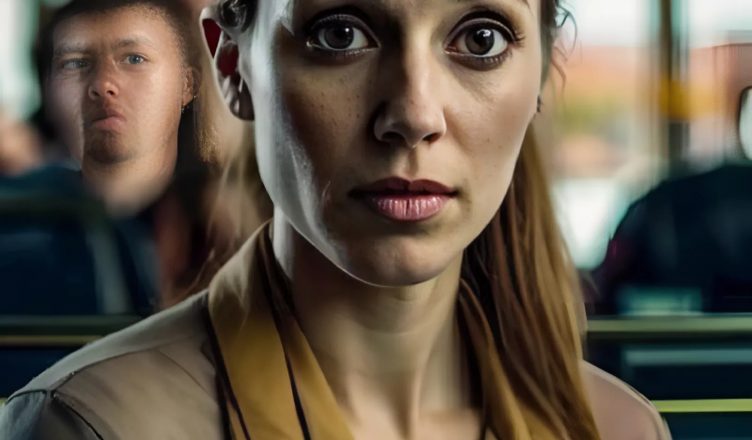She stepped out of the prison gates with a light plastic bag holding just what the law allowed: a change of clothes, a few bills in her wallet, and a piece of paper confirming her early release. The world beyond the gates felt too loud, too fast — cars rushing by, unfamiliar faces, a city that had kept moving as if she’d never existed.
The bus ride home was supposed to mark the beginning of a new life. Hope, fragile but real, stirred inside her. Maybe, just maybe, she could start over. Find a job. Reconnect with her daughter. Forget the past. Reinvent herself.
She stepped onto the crowded evening bus. Rush hour — workers returning home, tired faces everywhere. She spotted a seat by the window and moved toward it. Just as she was about to sit down, she noticed an old woman standing nearby, struggling with a heavy shopping bag. Without thinking, she gave up her seat.
The old woman sat down with a nod of thanks, looked up at her with sharp eyes, and said,
“Thank you, my dear. You’ve had a hard road. I can see it. But there’s strength in you. More than you realize.”
She tried to smile and look away, uncomfortable with the stranger’s intensity. But then the old woman reached out and gently touched her hand.
The touch was feather-light — but something shifted inside her. As if time had paused for a second.
«You’ve paid for your mistake,” the fortune teller whispered. “But there’s one knot left in your path. One thread you haven’t untangled yet.”
She instinctively pulled her hand back. The words struck her like lightning. How could this woman know? Her clothes, her face — nothing about her screamed “ex-convict.” And yet the old woman spoke with quiet certainty:
“The one you betrayed is still waiting. He hasn’t forgiven — but he hasn’t let go, either. You won’t be truly free until you return to him. Only then will your road open.”
The bus lurched forward. The world resumed its noise and movement. Passengers stared out the windows, scrolled their phones. But she stood frozen, the old woman’s touch still tingling on her skin.

She didn’t believe it at first. She couldn’t. Too many years of lies and illusions had taught her to doubt everything. And yet something in the old woman’s eyes — or perhaps her voice — unlocked a memory buried deep inside her.
The one she betrayed.
Her brother. The only one who had tried to save her when she got involved with a criminal crew. He warned her. Begged her not to go through with the deal. She didn’t listen. And when it all fell apart, it was him who shouldered part of the blame, trying to protect her. She got two years. He gave her five years of silence.
The next day, she went to see him.
The address hadn’t changed — the house they’d grown up in, full of childhood echoes and long-gone holidays. She walked there like approaching a cliff. What could she possibly say? How do you atone for betrayal?
The door opened. He stood there — older, grayer — but the eyes were the same. Deep, watchful. He looked at her for a few seconds, and then, without a word, she broke. The tears came fast. He pulled her into a hug. No questions. No blame.
In that moment, she knew: the old woman had been right. The knot was undone.
Months passed. She found a job. Slowly rebuilt trust with her daughter. Started attending support group meetings. But most importantly — for the first time in years — she felt truly free.
This story spread fast — across forums, social media, even local news sites. Why? Because it struck a chord. It spoke to something universal. Redemption isn’t just a legal process — it’s a human one. A private journey no paperwork can complete.
Each of us carries invisible chains: guilt, regret, unresolved pain. Sometimes, all it takes to unlock them is a single human moment — a shared seat on a bus, a touch, a truth spoken aloud.
This story went viral not because of the mystery — though the fortune teller added a haunting touch. It resonated because it felt real. Relatable. And because, deep down, we all want to believe that no matter how far we fall, we can still find a way back.
